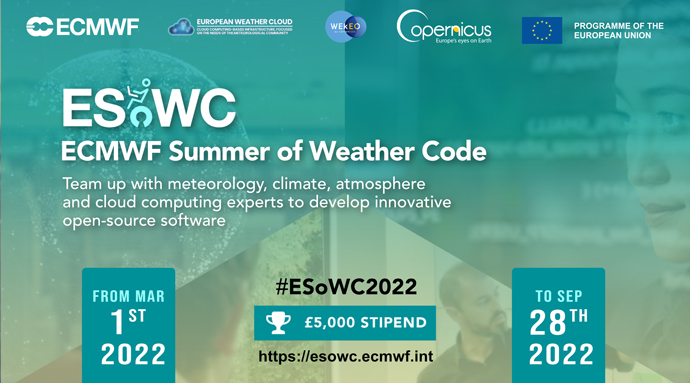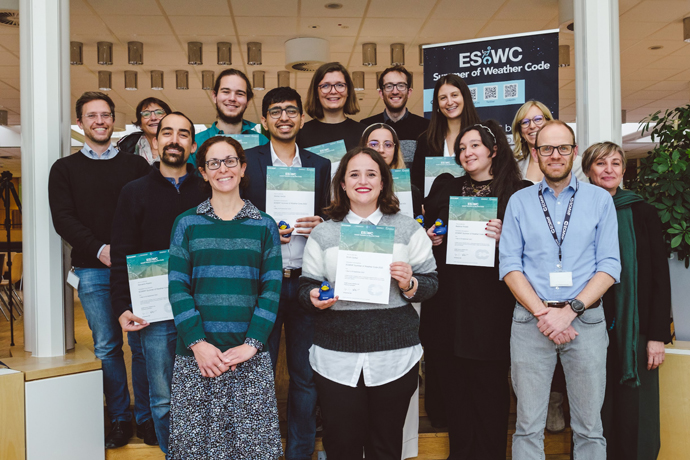

Julia Wagemann and Esperanza Cuartero, Programme managers of ECMWF Summer of Weather Code.
Since 2018, ECMWF’s Summer of Weather Code (ESoWC) has been fostering the development of open-source projects with one mission: to drive Earth science innovation. So far, a total of 37 cutting-edge open-source software projects have been developed under the ESoWC umbrella.
The 2022 ESoWC edition, which came to an end in September, produced six innovative open-source software solutions beneficial for various activities at ECMWF.

In 2022 we ran our fifth ESoWC edition.
At the beginning of each year, a list of software-related challenges proposed by ECMWF staff is published on the open-source hosting service Github. Data scientists and open-source software developers are invited to browse through the challenges and have time until mid-April to submit their proposed solution.
At the end of April, an evaluation process selects the most suitable teams who will work on the proposed challenges during the coding phase from May to the end of August. The selected groups team up with ECMWF mentors, who provide guidance and expertise throughout the coding phase.
The Final ESoWC Day marks the official closure of an ESoWC edition and all teams are invited to present their results.
In its mission to drive Earth science innovation within the meteorological, climate and atmosphere community, ESoWC is supported by the two Copernicus services operated by ECMWF on behalf of the European Union (the Copernicus Climate Change Service and the Copernicus Atmosphere Monitoring Service), and by two cloud infrastructures (the European Weather Cloud and the Copernicus DIAS service WEkEO).
Final ESoWC Day hosted in Bonn
The fifth edition of ESoWC came to a close with a full day of presentations at ECMWF’s Bonn office on 28 September 2022. After two years of virtual meetings, it was a pleasure to see some of our teams in person. The six developer teams showcased their open-source software solutions and ESoWC participants and mentors had the opportunity to meet face-to-face after four months of intense coding and close collaboration.

ESoWC 2022 participants and mentors during the Final ESoWC Day at ECMWF in Bonn.
ESoWC 2022 projects were at the intersection of web development, software development, and applied data science.
Copernicus-related projects
Adjusting climate projections
Mentors: Edward Comyn-Platt, Chiara Cagnazzo, James Varndell.
Fiona Spuler and Jakob Wessel created the Python library Ibicus, which provides a flexible and user-friendly toolkit for the bias correction of climate models. Ibicus currently implements eight methods for bias correction with a unified interface. In addition, the package provides an evaluation framework to assess marginal, temporal, spatial, and multivariate properties of the bias-corrected climate model.
Ibicus, which is available via PyPl, could be crucial for climate impact-studies and many other applications.
Wildfire emission explorer
Mentors: Mark Parrington, Sebastien Garrigues, James Varndell, Miha Razinger
Giovanni Paolini and Ainhoa Murillo Iraola developed a graphical user interface (GUI) that simplifies the creation of wildfire emission plots allowing users to select data on demand, including the geographical domain of interest, the date of a specific event, the variable and the plot type. The application was built from a Jupyter notebook and includes interactive widgets.
The atmospheric pollution charts obtained with this application can be used for communication purposes in the press and on social media.
Web development projects
Three teams worked on web development applications to help internal and external users optimise their operational environments.
ECMWF user dashboard
Mentors: Eduard Rosert, Sylvie Lamy-Thepaut
Adarsh Narayan Pandey built on the user dashboard prototype, developed initially during ESoWC 2021, through the integration of widgets from individual applications and web services.
The outcome has moved the functionalities of the user dashboard closer to becoming operational, providing a central interface where it is possible to customise and monitor all applications.
CliMetLab web application
Mentors: Florian Pinault, Baudouin Raoult
Akshaj Verma worked on the implementation of a web-based graphical user interface (GUI) to make the configuration settings of the CliMetLab Python package easier.
This project enables a wide audience to fully utilise CliMetLab's functionalities, which aims to simplify access to meteorological and climate datasets.
Bringing Magics weather maps to Matplotlib
Mentors: James Varndell, Sylvie Lamy-Thepaut, Stephan Siemen, Baudouin Raoult
Alish Dipani improved the Python interface for Magics using the libraries Matplotlib and Cartopy. Magics is the geospatial visualisation library widely used at ECMWF and its Member and Co-operating States.
The enhanced features, such as aspect ratio, axes and colour bar, would allow users to create more customisable and interactive weather and climate plots.
Flood forecasting
CW4Floods
Mentors: Marie-Amelie Boucher, Cinzia Mazzetti, Florian Pappenberger, Jan Seibert, Juan Colonese
Mohit Anand, Emiliana Myftari, Beatrice Rinaldi and Enxhi Sulkja explored the hydrological citizen data CrowdWater and its application in flood forecasting. They developed a Python package to facilitate the use of crowdsourced hydrological measurements for forecast validation.
The project has transformed water level variations into a variable used for verification of hydrological forecasts.
Coming up: ESoWC 2023 on its way
ESoWC will continue to drive Earth science innovation, and the sixth edition, ESoWC 2023, is already in preparation. We will be calling for applications from developer teams in early 2023.
We are also seeking expert mentors and we would love to work with you through the ESoWC programme, to help tackle challenges in your area.
The sixth edition promises to be full of innovative open-source software developments, world-class mentorship and fruitful partnerships.
For any updates, go to the ESoWC website, sign up for the newsletter, and follow ECMWF Summer of Weather Code on Twitter.
